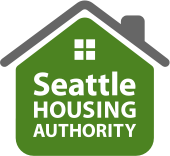SEATTLE — November 22, 2011 — In a unanimous decision at its November 21 meeting, the Seattle Housing Authority Board of Commissioners approved a resolution to adopt and implement a policy that will prohibit smoking in all dwelling units owned by the agency.
The policy, which will be implemented on or before February 1, 2012, states that smoking will not be permitted in individual apartment homes or the common spaces of any Seattle Housing Authority community or facility, unless otherwise specified.
"This is a significant decision on behalf of the health of our residents. I am proud of the stance our Commissioners have taken and look forward to implementing the new policy with fairness and compassion," said Tom Tierney, Executive Director of Seattle Housing.
The new non-smoking policy does not mean that residents or employees will have to quit smoking in order to live and or work at agency properties. The policy simply limits smoking to designated areas. For residents who are interested in quitting smoking, the agency is committed to providing tobacco cessation information and resources.
In August 2010, Seattle Housing implemented a non-smoking policy across all Seattle Senior Housing Property (SSHP) buildings. The agency then passed a resolution in October 2010 expanding the rule to include both new construction projects and substantially rehabilitated properties.
This new policy will extend access to a non-smoking environment to all residential apartment units, including Low-Income Public Housing (LIPH) units as well as all units in HOPE VI communities, special portfolio buildings, and privately managed buildings.
Resident feedback of the non-smoking policy has been largely supportive, first indicated by a residential survey in April 2011 which showed 71 percent of LIPH residents supporting a completely smoke-free environment for all public housing. A small number of residents have opposed the policy, concerned that their personal rights are being infringed upon.
John Littel, Chair of the Seattle Housing Board of Commissioners, addressed the extensive process the agency and its board have taken on to ensure that a fair policy was drafted.
"This is a policy we have been considering for over a year. We have done extensive outreach and community meetings and have had almost monthly conversations about it at our board briefings, Littel said. "We have made several revisions to the policies as a result of feedback we have gotten. We will continue to follow the implementation of the policy and will take the issues brought up today very seriously."
Due to numerous health studies indicating the dangers of secondhand smoke – especially to children, the elderly, and people who are ill – the U.S. Department of Housing and Urban Development (HUD) sent all public housing authorities a recommendation in 2009 that they make their buildings smoke-free. Approximately 275 housing authorities across the U.S. have already implemented similar policies.
Julie Peterson, Senior Director of Public Affairs at the Comprehensive Health Education Foundation, spoke of the overwhelming health data regarding the dangers of secondhand smoke.
"There is no safe level of secondhand smoke. The King County Board of Health is encouraging all rental housing organizations to make their apartments smoke-free. It is a trend that is happening nationally throughout the rental housing industry," said Peterson. "We have found that the majority of residents – even smokers – support a no-smoking policy in their rentals."
Seattle Housing provides homes for a variety of people, including seniors, people with health problems or disabilities, children, and vulnerable population groups. Some suffer from heart and respiratory problems including emphysema, asthma, bronchitis and heart disease. Secondhand smoke in their environment often worsens their condition by intensifying symptoms.
The process of drafting the Non-Smoking Policy involved examining policies from various regional housing authorities and receiving input from Public Health Seattle & King County, as well as holding multiple meetings with agency staff, the Smoke-Free Housing Advisory Council, and Seattle Housing residents.
Residents will be notified of the policy change and will be invited to community meetings to understand the policy, what is involved, and how to comply. Residents will also be required to sign a lease addendum.
